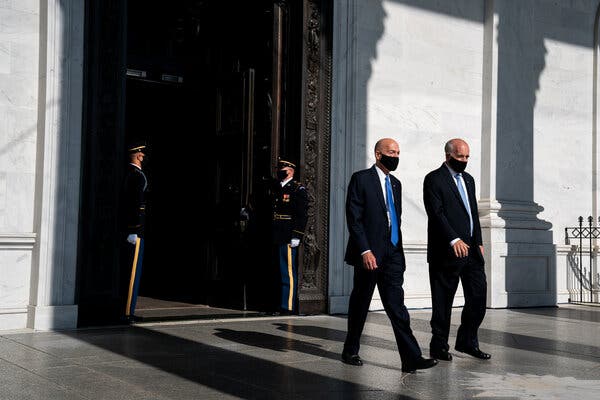Two Senate committees are scheduled to begin an investigative hearing Tuesday to scrutinize the security breakdowns that failed to prevent the deadly rampage by Trump supporters.
The joint hearing will start at 10 a.m. and will include questioning of officials who were in charge of securing the Capitol during the attack, when Capitol Police officers and members of the District of Columbia police force called in as reinforcements were overrun as the vice president and members of Congress were gathered inside.
The meeting of the Homeland Security and Governmental Affairs Committee and the Rules and Administration Committee will be the first time the public has heard from the top two security officials at the Capitol on the day of the assault, both of whom have resigned in the wake of the attack.
Paul D. Irving, the former House sergeant-at-arms, and Michael C. Stenger, the former Senate sergeant-at-arms, have come under scrutiny amid reports that they did not act swiftly enough to call for the National Guard. The committees will also hear from Steven A. Sund, the former chief of the Capitol Police, who has also resigned, and Robert J. Contee, the chief of the Metropolitan Police Department.
The hearing on Tuesday will be the first of a series of oversight hearings organized by Senator Amy Klobuchar, a Democrat from Minnesota and the chairwoman of the Rules Committee, and Senator Gary Peters, Democrat of Michigan and the chairman of the Homeland Security Committee, along with the top Republicans on both panels, Senators Roy Blunt of Missouri and Rob Portman of Ohio.
But already, the congressional investigation of the Capitol riot — the deadliest attack on the building in 200 years — has turned political. Republicans are resisting a proposal by Speaker Nancy Pelosi, Democrat of California, to form an independent, bipartisan commission modeled after the one that investigated the Sept. 11 terrorist attacks, arguing that her blueprint would skew the panel toward Democrats.

The United States Supreme Court on Monday cleared the way for the Manhattan district attorney to obtain eight years of federal income tax returns of former President Donald J. Trump and other records from his accountants. The decision capped a long-running legal battle over prosecutors’ access to the information.
Whether prosecutors find evidence of crimes, however, will also depend on other information not found in the actual returns.
The New York Times last year provided a preview of what awaits the district attorney, Cyrus R. Vance Jr., when it obtained and analyzed decades of income tax data for Mr. Trump and his companies. The tax records provide an unprecedented and highly detailed look at the byzantine world of Mr. Trump’s finances, which for years he has simultaneously bragged about and sought to keep secret.
The Times’s examination showed that the former president reported hundreds of millions of dollars in business losses, went years without paying federal income taxes and faces an Internal Revenue Service audit of a $72.9 million tax refund he claimed a decade ago.
Among other things, the records revealed that Mr. Trump had paid just $750 in federal income taxes in his first year as president and no income taxes at all in 10 of the previous 15 years. They also showed he had written off $26 million in “consulting fees” as a business expense between 2010 and 2018, some of which appear to have been paid to his older daughter, Ivanka Trump, while she was a salaried employee of the Trump Organization.
The legitimacy of the fees, which reduced Mr. Trump’s taxable income, has since become a subject of Mr. Vance’s investigation, as well as a separate civil inquiry by Letitia James, the New York attorney general. Ms. James and Mr. Vance are Democrats, and Mr. Trump has sought to portray the multiple inquiries as politically motivated, while denying any wrongdoing.

The Biden administration announced on Monday that it would not allow broad cancellation of standardized tests this year, but would offer flexibility from some high-stakes federal mandates.
In a letter sent to state education chiefs on Monday, Ian Rosenblum, acting assistant education secretary, wrote that the Education Department was “not inviting blanket waivers of assessments,” which the Trump administration had issued at the outset of the pandemic. However, the department said in a statement that it was encouraging states to make wide-ranging modifications, such as extending the testing window to summer and fall, giving assessments remotely and shortening their length.
The department also said it would consider applications from states looking to waive certain federal requirements, such as an accountability provision in the federal K-12 law, the Every Student Succeeds Act, that requires a 95 percent test participation rate. The department will also allow waivers from rules that would require states to identify and overhaul their lowest-performing schools based on data from the current school year.
“The intent of these flexibilities, and the accountability waivers, is to focus on assessments to provide information to parents, educators and the public about student performance and to help target resources and supports,” Mr. Rosenblum wrote.
The highly anticipated decision was met with mixed reactions from key stakeholders.
The issue of standardized testing has divided the education community. Some education groups, including teachers’ unions, believed that testing students would be cumbersome and impractical in a year that has completely upended the education system. Other groups, like organizations that promote educational equity, believed that assessments would provide crucial data points for grasping the toll that the pandemic has taken on student achievement.
Mr. Rosenblum also wrote in his letter that “it is urgent to understand the impact of Covid-19 on learning,” and that “state assessment and accountability systems play an important role in advancing educational equity.”
Randi Weingarten, president of the American Federation of Teachers, a powerful ally of the Biden administration, said that while the administration had done “admirable work” in managing the pandemic, “it is a frustrating turn to see the administration ask states to continue requiring assessments during this tumultuous school year.”
Ms. Weingarten said that the union supported the use of “locally developed, authentic assessments that could be used by educators and parents as a baseline for work this summer and next year.”
A national survey released by the National PTA on Monday found that 60 percent of parents were worried that their child was behind and wanted more information on their academic progress, and 52 percent of parents favored end-of-year testing this spring. A majority of parents also wanted to see modifications, and believed that the results should not be used against students or their schools.
“Statewide assessments are one of multiple measures that, when combined, help give a clearer picture of where children are academically and help equip parents to effectively advocate on behalf of their child’s learning,” the organization’s president, Leslie Boggs, said in a statement.


















